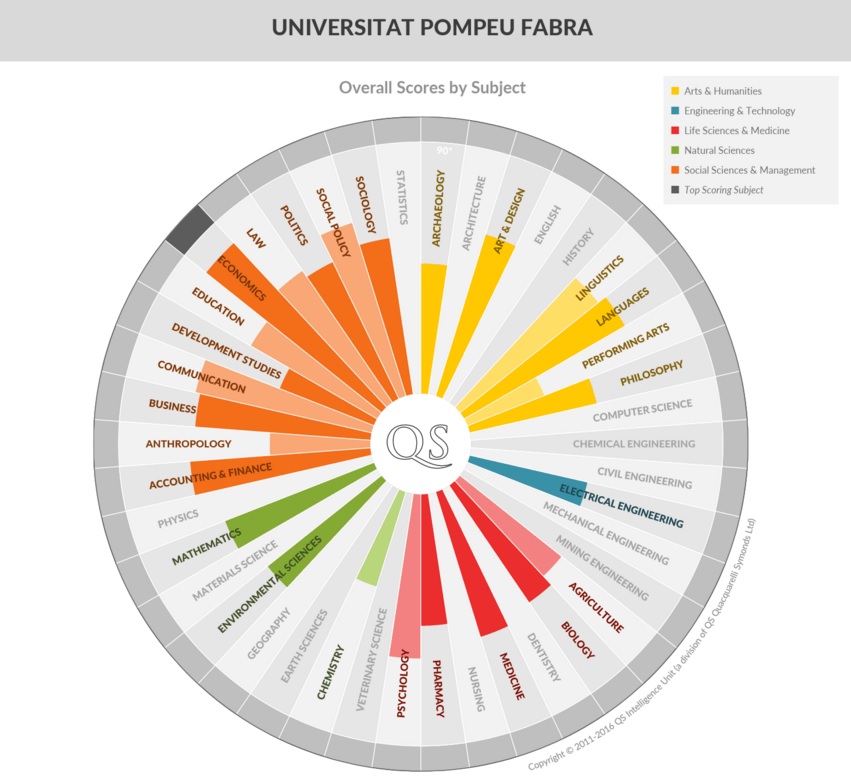UPF improves its position in the QS ranking by subjects
The eleven disciplines assessed improve or consolidate their position in a classification in which the studies in Economics and Econometrics are among the top 20 in the world.
 UPF has improved or consolidated its position in all disciplines assessed in the ranking by subjects published by QS today. Of the eleven fields evaluated, the University stands out for the studies in Economics and Econometrics, among the top 20 in the world, and in Social Policy and Administration, assessed by QS for the first time this year and in which UPF comes among the 100 best universities in the world.
UPF has improved or consolidated its position in all disciplines assessed in the ranking by subjects published by QS today. Of the eleven fields evaluated, the University stands out for the studies in Economics and Econometrics, among the top 20 in the world, and in Social Policy and Administration, assessed by QS for the first time this year and in which UPF comes among the 100 best universities in the world.
As for the rest of subjects, the University is among the top 150 universities in the world for Accounting and Finance; Communication and Media Studies, and Linguistics. It then stands out in Law, Politics and International Relations, Sociology and Modern Languages (151-200) and, finally, in the fields of Medicine and Biology (301-350).
The following table shows the evolution of UPF in this ranking over the last five years.
|
Disciplines |
Evolution of UPF according to disciplines |
||||
|
2016 |
2015 |
2014 |
2013 |
2012 |
|
|
Accounting and Finance |
101-150 |
151-200 |
101-150 |
101-150 |
101-150 |
|
Communication and Media Studies |
101-150 |
151-200 |
151-200 |
151-200 |
101-150 |
|
Economics and Econometrics |
20 |
23 |
40 |
34 |
38 |
|
Law |
151-200 |
151-200 |
101-150 |
151-200 |
-- |
|
Linguistics |
101-150 |
101-150 |
101-150 |
101-150 |
-- |
|
Politics and International Relations |
151-200 |
151-200 |
101-150 |
151-200 |
101-150 |
|
Sociology |
151-200 |
-- |
101-150 |
151-200 |
-- |
|
Modern Languages |
151-200 |
201-250 |
-- |
-- |
-- |
|
Medicine |
301-350 |
301-350 |
-- |
-- |
-- |
|
Biology |
301-350 |
301-350 |
-- |
-- |
-- |
|
Social policy and Administration (new 2016) |
51-100 |
||||
A methodology based on universities’ reputation and influence
This ranking, published yearly by QS since 2011, ranks up to a total of 42 subjects grouped into five areas: Arts and Humanities, Engineering and Technology, Life Sciences and Medicine, Natural Sciences, and Social Sciences and Administration.
With regard to its methodology, QS uses three indicators already present in the global rankings it publishes every autumn. A survey on academic reputation, a survey on employer reputation and the citations of each publication. The first two are global surveys carried out by QS each year in which academics and employers of degree holders are asked to identify which are the best universities in the world both generally and in their own area of specialization. The third indicator assesses the citations received by each publication, based on analysis of the publications from the Scopus database. Concerning this indicator, since 2013, QS has also used a scoring based on the H-index, a way of measuring both the productivity and the impact of a researcher’s publications. The index is based on all of the most cited articles by the researcher in question and the number of citations received in other publications.
Through this methodology, QS seeks to provide information about the most valued and the most influential universities in each subject.
